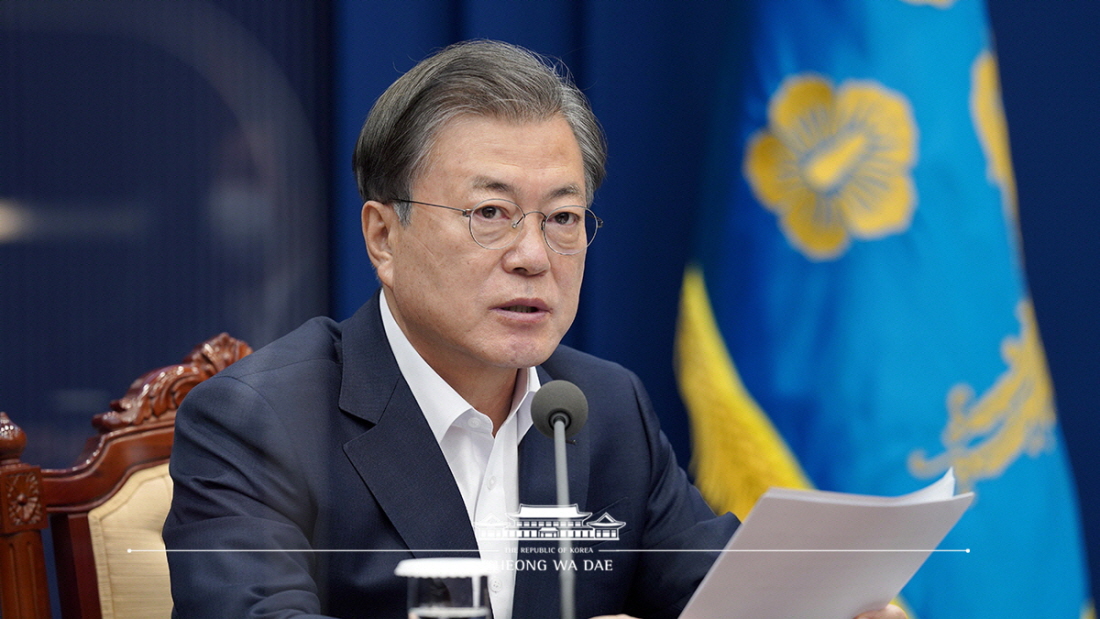이 웹사이트는 제19대 대통령 임기 종료에 따라 대통령기록관이 「대통령기록물 관리에 관한 법률」에 의해 이관받아 서비스하는 대통령기록물입니다. 자료의 열람만 가능하며 수정 · 추가 · 삭제는 불가능합니다.
다만, 「개인정보보호법」에 의하여 개인의 정보를 보호받기 원하시는 분은 관련 내용(요청자, 요청내용, 연락처, 글위치)을 대통령 웹기록물 담당자(044-211-2253)에게 요청해 주시면 신속히 검토하여 조치해 드리겠습니다. 감사합니다.
SPEECHES & REMARKS
BRIEFINGS

The world should move toward “carbon neutrality” together as a joint response to the climate crisis. Countries across the globe are declaring carbon neutrality as the inevitable choice for a sustainable earth. At the forefront of this cause, the European Union announced last year that it would become carbon-neutral by 2050 through the European Green Deal. China and Japan also set carbon neutrality targets for 2060 and 2050, respectively. As such, the entire world is moving toward a common goal of overcoming the climate crisis.
We, too, should actively join this global trend as a responsible member of the international community. When I addressed the National Assembly to propose the government budget, I made a solemn pledge that reflected our intent to strive to become carbon-neutral by 2050. This was a declaration to take the climate crisis seriously and embark on the responses and action needed.
Achieving carbon neutrality by 2050 is not going to be easy. We have a manufacturing-intensive industrial structure, while being heavily dependent on fossil fuels with renewables still making up a low proportion of our energy sources. For these reasons, the challenge is all the more difficult for our country. Moreover, lowering the cost of alternative energy sources constitutes an immense task.
However, responding to the climate crisis is not an option but a must. Simply for the sake of humanity’s survival and the future of the Republic of Korea, this is the path we must take. If it is unavoidable, we should boldly take up the challenge with a proactive and aggressive attitude, rather than being dragged down by regulations. To achieve carbon neutrality, we have to make all-encompassing efforts to reduce greenhouse gas emissions. In addition, we should use this as an opportunity to speed up the transition to a low-carbon society while stimulating innovation in all areas of our society.
Achieving carbon neutrality is also imperative for maintaining our economic growth. A low-carbon economy is already becoming the new economic order. With EU member states and other major countries continuing to raise environmental regulations and barriers, businesses will only be able to survive if they adapt to an eco-friendly, low-carbon economy. Just to make the development of our economy sustainable, we should seize carbon neutrality as an opportunity to innovate our technologies and industrial structure as well as to create new growth engines and jobs.
To become carbon-neutral by 2050, it is necessary for Korea to prepare in a calm and level-headed manner. I ask you to reexamine our plan to cut greenhouse gas emissions while refining the energy transition roadmap – from a fossil fuel-heavy energy mix to one with eco-friendly renewable energies. In particular, I urge you to devise ways to accelerate the energy transition from multiple angles, including boosting decarbonization and the hydrogen economy and increasing the proportion of renewable energies. We also need to push ahead more swiftly with the industry innovation strategy aimed at building a green industrial ecosystem.
We must strongly back the industrial sector’s development of new innovative decarbonization technology and alternative fuels while reinforcing multifaceted support for the transition to a low-carbon industrial structure. We must also pay special attention to the low carbonization of buildings and transportation. I ask you to do everything possible to devise measures that protect businesses and workers during the shift to a low-carbon economy while vigorously pushing ahead with the grand transformation to a circular economy that minimizes energy use and maximizes recycling and reuse.
We must prepare a firm foundation to push carbon neutrality by 2050. Since goals are best achieved when pursued as part of a national strategy, we must first establish a strong framework for implementation. Seoul, Gwangju, Chungcheongnam-do, Jeju and other local governments are taking the lead by setting carbon neutrality goals on their own. It is necessary to expand these efforts to all local governments and attract the private sector’s participation and cooperation. I ask you to further strengthen efforts to reach out to the industrial sector while working on detailed plans to form a public consensus.
We also have to establish an institutional foundation to back carbon neutrality. I ask the National Assembly, too, to actively work together by drawing on that spirit shown when they passed the nonpartisan Emergency Response to Climate Change resolution to achieve carbon neutrality by 2050. I would like you to gather your wisdom so that successive administrations can continue these efforts going forward.



